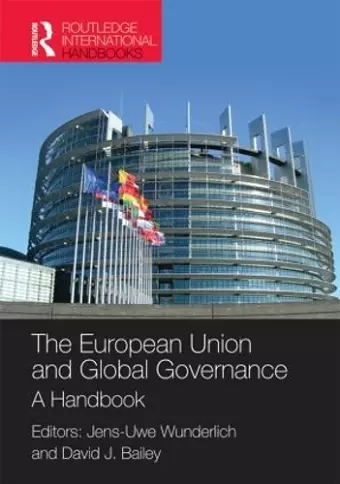The European Union and Global Governance
A Handbook
David J Bailey editor Jens-Uwe Wunderlich editor
Format:Hardback
Publisher:Taylor & Francis Ltd
Published:17th Dec '10
Currently unavailable, and unfortunately no date known when it will be back
This hardback is available in another edition too:
- Paperback£59.99(9781857438260)

The role of the European Union in global politics has been of growing interest over the past decade. The EU is a key player in global institutions such as the World Trade Organization (WTO) and NATO. It continues to construct an emerging identity and project its values and interests throughout contemporary international relations. The capacity of the EU to both formulate and realise its goals, however, remains contested. Some scholars claim the EU’s `soft power’ attitude rivals that of the USA’s `hard power’ approach to international relations. Others view the EU as insufficiently able to produce a co-ordinated position to project upon global politics. Regardless of the position taken within this debate, the EU’s relationship with its external partners has an increasingly important impact upon economic, political and security concerns on an international level. Trade negotiations, military interventions, democracy promotion, international development and responses to the global economic crisis have all witnessed the EU playing a central role. This has seen the EU become both a major force in contemporary institutions of global governance and a template for supranational governance that might influence other attempts to construct regional and global institutions.
This volume brings together a collection of leading EU scholars to provide a state-of-the-art overview covering these and other debates relating to the EU’s role in contemporary global governance. The Handbook is divided into four main sections:
Part I: European studies and global governance – provides an overview and critical assessment of the leading theoretical approaches through which the EU’s role in global governance has been addressed within the literature.
Part II: Institutions – examines the role played by the key EU institutions in pursuing a role for the EU in contemporary international relations.
Part III: Policy and issue areas – explores developments within particular policy sectors, assessing the different impact that the EU has had in different issue areas, including foreign and security policy, environmental policy, common commercial policy, the Common Agricultural Policy, development policy, accession policy, the Neighbourhood Policy and conflict transformation.
Part IV: The global multilevel governance complex and the EU – focuses on the relationship between the EU and the institutions, regions and countries with which it forms a global multilevel governance complex, including chapters on the EU’s relationship with the WTO, United Nations,...
‘This handbook is encyclopedic in its breadth and range … Each of the chapters is theoretically sensitive, and has depth, detail, and interpretive analysis sometimes lacking in the empirical tradition of EU studies. This study of the EU will be essential reading for years to come.’ - John Gaffney, Professor of Politics, Co-Director, Aston Centre for Europe, Aston University
ISBN: 9781857435092
Dimensions: unknown
Weight: 690g
408 pages